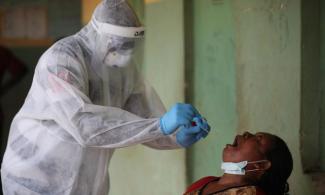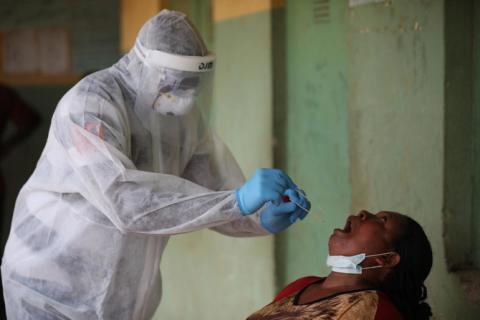
Odubanjo said the frequency of sensory deprivation among Nigerians was not strong enough for the Nigeria Centre for Disease Control to change its present case definition of, who should be tested for Coronavirus.
Public health physician, Dr Doyin Odubanjo, has reacted to the growing complaints of loss of smell and taste by Nigerians on Twitter, which has since triggered Coronavirus scare.
Odubanjo said the frequency of sensory deprivation among Nigerians was not strong enough for the Nigeria Centre for Disease Control to change its present case definition of, who should be tested for Coronavirus.
He told SaharaReporters in an interview that the centre looks at the history of symptoms presented by patients in reviewing its testing guidelines.
Nigerians took to Twitter comparing experiences on how they had temporarily lost their sense of taste and smell. They also expressed surprise at how ‘no one’ seemed to be saying anything about the issue.

Odubanjo reasoned that the frequency of sensory deprivation across the country had not gained a significant distribution.
He, however, said that the NCDC was looking into the conversation.
“The NCDC is using the frequency of symptoms as seen in Nigeria,” Dr Odubanjo said. “They will look at how many people they have and how many are reporting those symptoms for them to define it that way.”
“I can tell you for a fact, the NCDC is aware of the issue trending on social media and they are looking into it,” he said.
Odubanjo added that the NCDC was working with the diagnosis it had been making from the patients, who presented themselves.
“What they would use are the people they have seen, the people they have diagnosed,” he said.
The persons on the Twitter thread, which started the conversation, appeared not to have done any COVID-19 tests though.
Replying to his tweet, which began the thread, a user @LANREWAJU_ asked, “Is the loss of sense to smell and taste part of the symptoms of COVID-19?”
Another user, @OluwaseunTuase, responded, “Those are asymptomatic patients. Thanks to whatever it is that makes the virus less virulent in our clime.”
Another person on the thread — @trending_medic, countered Tuase’s view, saying, “Losing sense of smell and taste are symptoms. They're not asymptomatic sir.”
Someone else in the conversation, @9jaGooners, said he or she was presently unable to distinguish smell.
“This is exactly what I'm feeling. Everything that comes to my nose smells the same way. I spray perfumes on my hands just to see if I'll be able to perceive - same horrible smell,” the user said.
The most recent case definition released by the NCDC listed severe acute respiratory difficulty, fever, contact with symptomatic patients, among others, as conditions to be considered in deciding if a person should be asked to take a test.
It does not mention the loss of taste or loss of smell as one of the symptoms of COVID-19.
But a piece by a medical lecturer, David Nunan, published by the Centre for Evidence-Based Medicine in the UK, said sensory deprivation had been reported among COVID-19 patients in China since February.
A study had then discovered in communities across the UK and the USA that 65 per cent of COVID-19 positives and 22 per cent of negatives reported losing their ability to smell or taste or both.
While noting the discrepancies in his review of different researches, Nunan said this sensory deprivation was also reported by persons suffering from flu, who do not have COVID-19.
As Nigerians wait on the NCDC to tell those of them suffering sensory deprivation if they have Coronavirus, many seem to be taking treatment for malaria.
A Twitter user, @Blessjioke, said if it was true that sensory deprivation was a symptom of COVID-19 then "we are safe," because, “everyone I know has recovered with malaria treatment.”
Before the development of this thread, SaharaReporters had asked NCDC if it was recording symptoms of loss of smell and taste among patients, who were in isolation centres or who were convalescing at home but received no response from the agency.